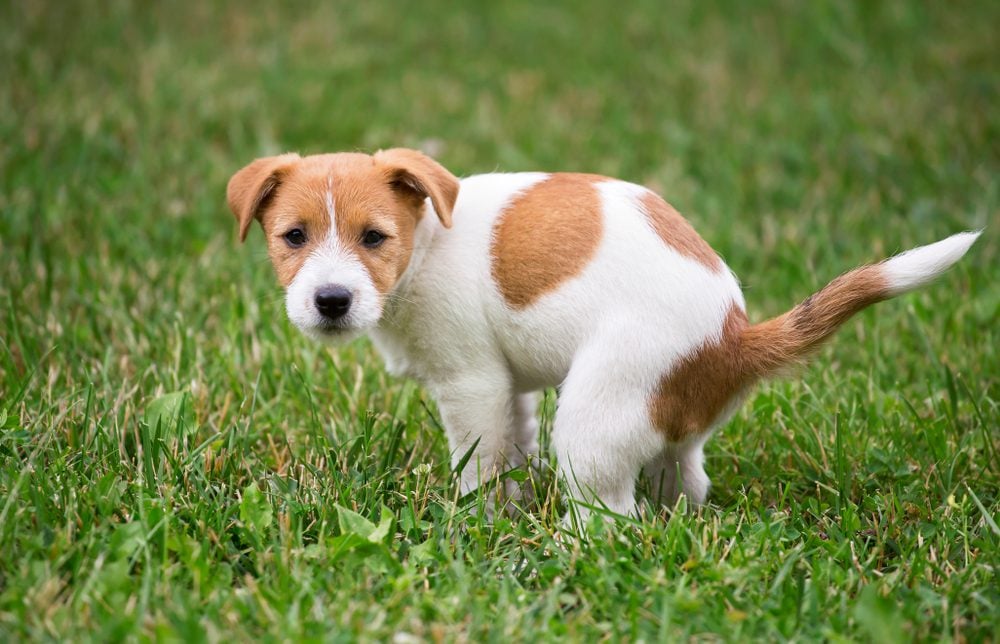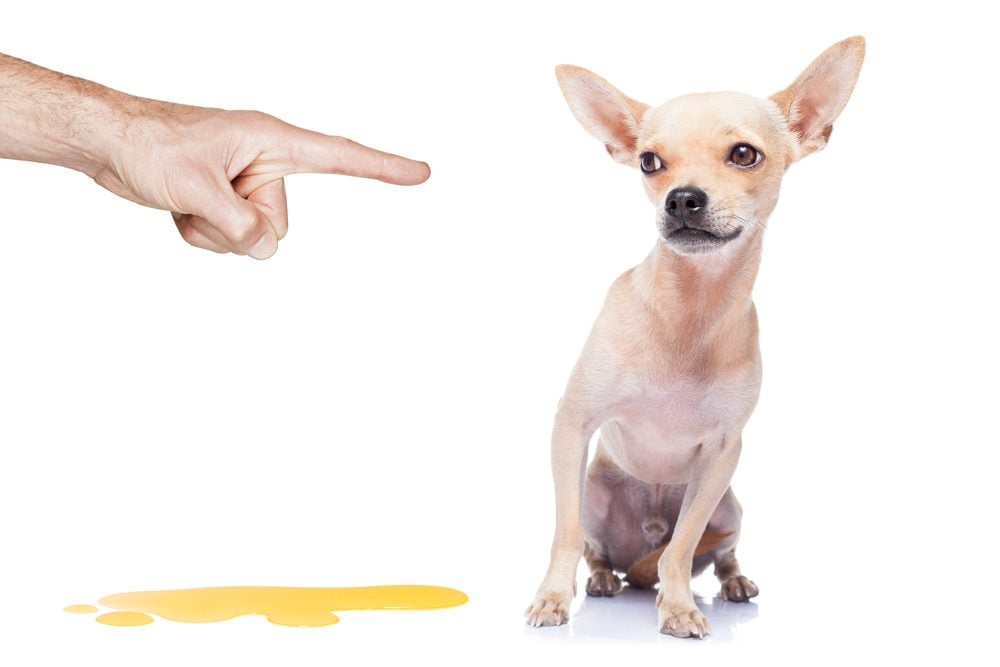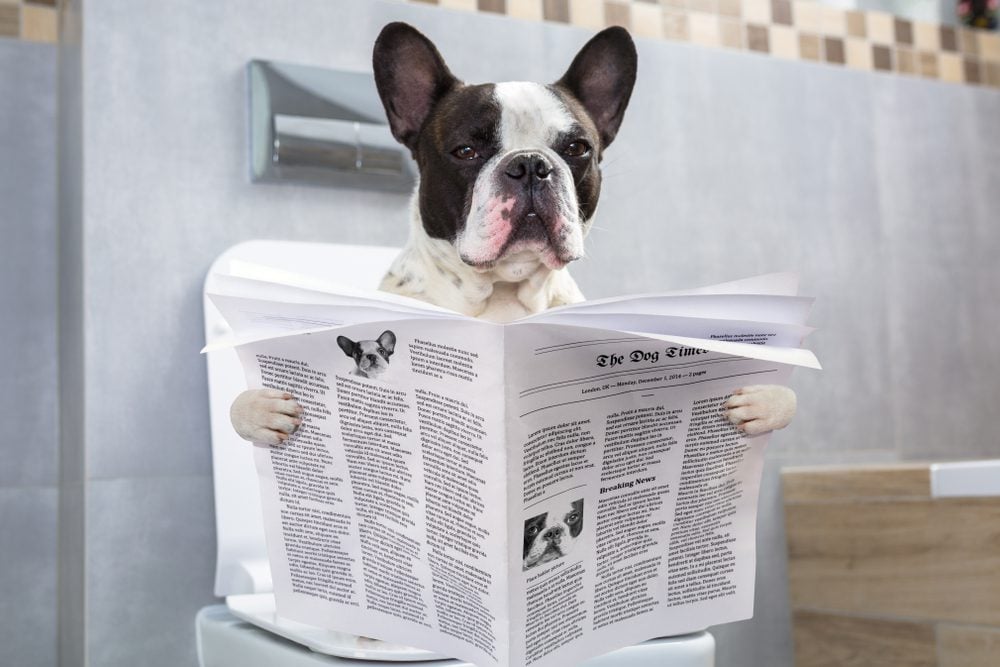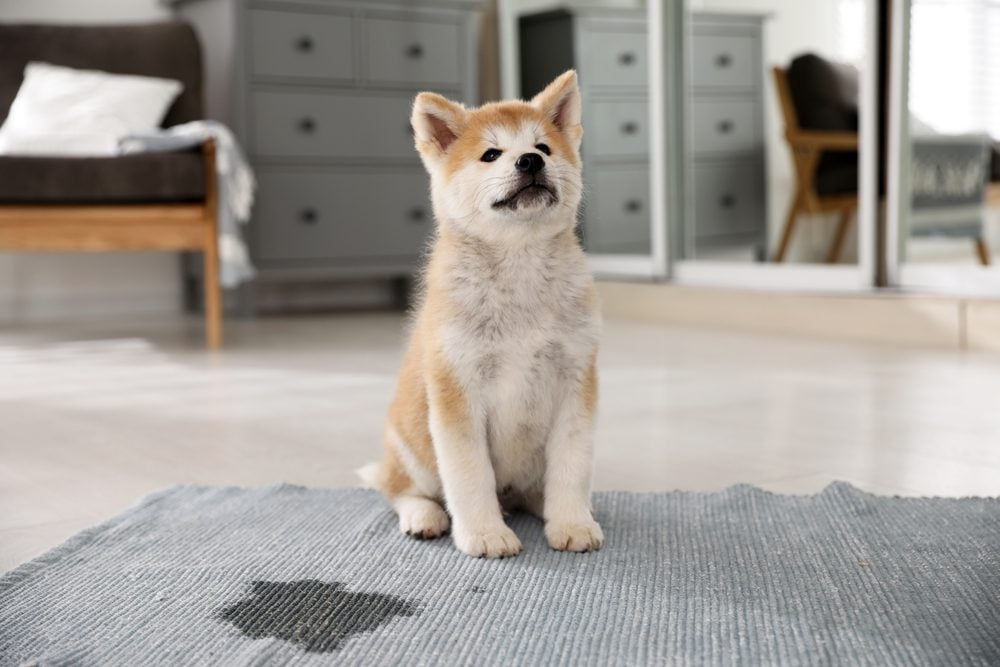Puppies are adorable and precious, and their time as wee little creatures is very short. As much as we want to cherish their puppy stage, we simultaneously can’t wait until they have more control over their bladders.
Until they do, we’re constantly taking them outside, sometimes even in the middle of the night! Not only that, but it’s inevitable that we’ll have to clean up a number of pee puddles or stains.
Because of this, many pet parents (especially first-time dog owners) wonder how long it takes to potty train a puppy. Today, we’ll be discussing exactly that, as well as providing some tips for how to effectively potty train a pup.
How Long Does It Take to Potty Train a Puppy?
Every puppy is different, so how long it takes to potty train them will be different as well. However, you can expect most dogs to be fully potty trained by the time they are four to six months of age.
On the other hand, there are cases of dogs who aren’t fully potty trained until about a year of age. For these dogs, what can happen is that they understand they should be pottying outside, but they may have accidents if they aren’t let out immediately after play or other types of excitement.
For many dogs, understanding that they should urinate in the yard rather than indoors usually takes about four to eight weeks. However, even after your dog has learned to go outside, you need to let them out often to avoid accidents. Puppies can only hold their pee for so long.
As puppies grow, so do their organs, including the bladder. Because of this, you can expect that older puppies can hold their bladder for longer and have more control than younger puppies. You can also understand that puppies are having accidents because they’re still growing and developing.
Sometimes, it’s not that your dog doesn’t understand the concept of pottying outside. Instead, they just don’t have the proper hardware to hold it or to wait as long as you’ve tried to make them wait.
Factors That Affect How Long Potty Training Takes
As we mentioned, all dogs are different and will learn at different rates. Some will understand right away that they should potty outside, whereas for others, it’ll take a bit longer. However, there are some other factors that can contribute to how long it takes your dog to learn to do their business outdoors.
These factors directly involve you! Your involvement in and skill with training your dog can definitely affect how quickly your pup learns to piddle outside.
Experience
Your experience as a dog owner definitely factors into how long potty training takes. If you’re a first-time dog owner, then potty training will be just as much of a learning experience for you as it is for your dog. You may make more mistakes than someone who’s owned dogs before, and you may have moments where you feel lost or confused about what to do.
Luckily, there are plenty of resources available to help you (including this article!). As long as you’re willing to make an effort to learn about potty training, you can effectively train your dog. Your inexperience may just mean it takes your dog a couple of extra weeks.
On the flip side, experienced dog owners who have raised a number of puppies will have a firmer grasp on the best potty training practices. Their puppies will benefit from their experience and may get the idea quicker.
Schedule
It’s tough to juggle raising a puppy and having a full-time job. This is why many people make use of services like doggy-daycares or pet sitters. When a puppy is still very young, they have to go out several times per day. You may have to take them out over ten times!
Eight-week-old puppies usually can’t hold their bladders for much longer than an hour. We’ve even known puppies who had to be taken out every thirty minutes! As puppies get older, they can hold their bladders for longer. The rule of thumb is that a puppy can hold it for as many hours as they are months old (a four-month-old pup can theoretically hold it for four hours).
Our point here is that if your schedule makes it hard for you to take your puppy out as often as necessary, then potty training is going to take longer. In these cases, we recommend hiring a pet sitter over doing doggy daycare unless the doggy daycare explicitly states that they can help with potty training.
Many doggy daycares simply use indoor arenas, which may not be conducive to teaching your dog to potty outside. This is why we recommend having pet sitters or family members let your dog out when you cannot.
Consistency
Your schedule can be detrimental to your puppy’s learning primarily if it inhibits your ability to be consistent with training. Consistency is one of the most important factors in training any skill.
Consistency means that you always let your puppy out after they eat or drink, wake up, play, or experience any type of excitement. It means you always let your dog out before bed or before being put into the crate (more on that later). Consistency is having the same routine for your puppy every single day.
It’s also vital that every person involved with the dog’s training be on the same page. You should all be using the same methods to potty train your dog or your pup may get confused and take longer to grasp what you’re trying to teach.
Potty Training Tips



Now that you understand more about how long potty training takes and what factors can contribute to your dog’s learning speed, let’s talk about how to actually go about potty training. These are some of our best potty training tips.
Predict Accidents
You’re probably wondering how in the world you can predict when your puppy is going to have an accident. You’re not omniscient, after all. The thing is, there are actually a number of activities that are likely to cause your puppy to go potty. So, you can predict that your puppy will need to potty after them.
These types of activities include eating and drinking, waking up, playing, or anything that gets your puppy excited. Always take your pup out after these activities. You should also let your puppy out before bed or before you crate them.
Always Supervise Your Puppy
Another way you can predict accidents is by paying attention to your puppy. Really, you should be watching your puppy like a hawk until they’re reliably accident-free. Too much freedom gives your puppy plenty of opportunities to go potty while you’re not looking.
You should always keep your puppy in the same room as you. Use gates or a leash to do this. Some people find that tethering a young puppy with a leash is beneficial to training both proper potty behavior and other manners, because the puppy is never left to their own devices.
Reward Outdoor Elimination
You probably already know that dog training is all about rewarding your dog for doing something right. This also pertains to potty training. Every time your puppy goes to the bathroom outside, reward them.
Wait for your puppy to completely finish doing their business first, though. If you distract them, they may stop mid-elimination and end up finishing the job after you get back indoors.
Make sure to tailor the reward to what your dog loves the most. If your pup is food-oriented, then this is pretty easy; just give a tasty treat. If your dog is more play or toy-oriented, then throwing a ball once or twice or playing a quick game of tug is very rewarding.
Remember that going to the bathroom is, in itself, a rewarding experience for your dog because it provides relief. This is why it’s important to provide that motivation of food or play when your pup goes outside. It teaches them that going potty outside is extra rewarding and much more fun than doing so indoors.
Have Your Puppy Potty on Different Surfaces
If you’re planning to train your puppy to be a service dog, then you should also teach them that it’s okay to potty on multiple surfaces (just not in the house). Grass, astroturf, gravel, dirt, sand, woodchips, concrete, and puppy pads are all examples of places a working dog might be required to eliminate. If you only ever reward your dog for pottying on grass, she may not be comfortable pottying on the surfaces mentioned.
Service dogs also need to be able to go potty on command. You can work on this once your dog is reliably pottying outside. While your dog is going to the bathroom, say the command you plan to use and reward when they’re finished. You’ll have to repeat this many times. Eventually, your dog will understand what the command means and be able to do their business when asked.
Crate Training
There are multiple benefits to crate training your dog, and one of them is that it aids with potty training. Dogs do not want to soil the areas that they sleep in, so they’ll naturally do their best to hold it while in a crate.
However, the crate needs to be appropriately sized for this to work. When a crate is too large, a dog will simply eliminate at one end and sleep at the other. Therefore, many dog owners buy a crate that should match their dog’s size when fully grown, but block the rest of it off during puppyhood.
An appropriately sized crate allows your dog to stand up to their full height and turn around. Give your puppy enough room to lay down comfortably, but block off the rest of the crate to prevent accidents.
Though crate training can be a great help in potty training, it’s called crate training for a reason. In most cases, you have to teach your dog to like the crate. If you get really lucky, your puppy will take to it right away, but most dogs need some help.
The process typically involves slowly warming your dog up to the crate via treats or play, and then gradually working your way up to closing and locking the door. Be sure to study crate training so that you can introduce your dog to the space in a positive way that doesn’t create fear or anxiety.
Don’t Punish Your Puppy for Peeing in the House



There is an age-old belief that rubbing your dog’s nose in their accident will make them less likely to repeat it. This is absolutely untrue. The reality is that doing such a thing can damage your bond with your dog and make them fear you.
Punishing a dog for having an accident in the house can actually exacerbate the problem. Oftentimes, your dog does not understand what they’re being punished for. They can associate your harsh actions with some other type of behavior or stimulus.
For instance, some dogs may associate the punishment with having gone potty in front of you. They then become afraid to eliminate in front of you both indoors and outdoors. This leads to unexpected accidents inside because they will try to hide from you. Not only that, but they may simply refuse to go potty outside in front of you for fear of getting punished, leading to more accidents inside.
We’re sure you now understand why punishing is not only a bad option but is also detrimental to your training. Avoiding punishment and using positive methods like the ones we’ve already discussed will set you and your puppy up for success.
Use the Right Cleaner
If your puppy has an accident in the house, you need to use an enzymatic cleaner to clean it up. This is imperative because other types of cleaners will not get the smell of pee out of your carpet or floors. You may not be able to smell it, but your dog still can.
Dogs habitually go to the bathroom in places they’ve gone before. How do they know they’ve gone there? Because they can smell that they have. That’s why it’s important to get that smell out of your house. Only an enzymatic cleaner can do this for you.
Why Accidents Happen
Even if you do everything right, accidents will still happen. It’s important that you understand why so that you can approach them calmly and constructively. It’s also helpful to know the difference between an accident and a medical issue.
Small Puppies Have Small Bladders
Puppies are small; they’re only babies, so their bladders are still developing. The smaller your puppy is, the smaller their bladder will be. The smaller the bladder, the less urine it can hold. Because of this, younger, smaller puppies need to go out more frequently than older, larger puppies.
Not only that, but puppies don’t have any control of their bladders until about 16 weeks of age. Though they may gain control at this age, their bladder will keep growing and won’t be fully developed until about four to six months of age.
It’s for this reason that we say most puppies can be potty trained by the time they’re four to six months old: it’s at this age that their bladders are finally full-grown and they have full control. At four to six months, puppies will be able to hold more urine so they won’t have to go potty as often. They’ll also have had a decent amount of practice since you can work on potty training as soon as you bring your puppy home.
Urinary Tract Infections
While most accidents are a result of puppies being puppies, in some cases, there may be a medical reason. Urinary tract infections are one of the most common medical causes of frequent urination that results in accidents in the house.
A urinary tract infection is just what it sounds like — an infection in the urinary tract. These infections happen when bacteria get into the urinary tract and reproduce. The most common type of bacteria that causes UTIs is E.Coli, but other bacteria and even fungi can cause UTIs.
Of course, you can’t suspect a UTI if you don’t know the symptoms. Signs that your pet may have a UTI include bloody or cloudy urine, pain or discomfort during urination, accidents in the house, frequent urination, dripping urine, and frequent licking of the urinary opening.
If you notice any of these symptoms in your puppy, then you should visit the vet as soon as possible. UTIs can lead to even more serious issues, such as the formation of bladder stones.
Puppies Learn at Different Paces



The answer to “how long does it take to potty train a puppy” isn’t all that simple. Generally, most puppies can be fully housebroken by the time they are four to six months old. However, every dog is an individual and will learn at their own pace.
There are also a number of factors that can affect how quickly or slowly a dog learns. These factors concern you; your experience, availability, and ability to be consistent will directly affect your dog’s learning experience.
If you’re an experienced dog owner, you may be able to potty train your puppy more quickly because you already know exactly what to do. If your schedule doesn’t require you to be away for long hours of the day, then you’ll be around to take your pup out as many times as necessary. If your whole family uses the same training methods consistently, then your puppy won’t be caused any unnecessary confusion.
As you can see, there are many factors that contribute to how quickly a dog can learn proper pottying behaviors. Therefore, some puppies will catch on within a few weeks, whereas others may need a couple of months.
Remember that accidents are totally normal, and the more proactive you are about your puppy’s training, the more you’ll be able to prevent them. As long as you are patient, positive, and consistent, your puppy will learn to poop and pee outdoors instead of in the house.
